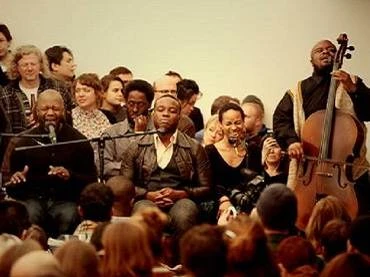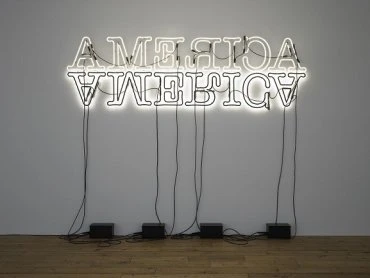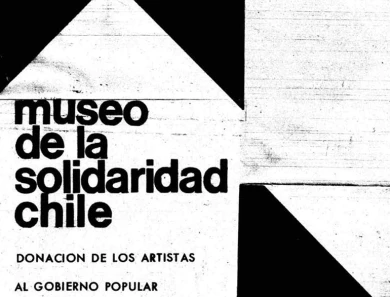Conversations. Theaster Gates and Glenn Ligon, in dialogue with Thelma Golden

Theaster Gates. The Black Monks of Mississippi. Performance, 2014
Held on 17 Feb 2015
This activity gets a new series of dialogues and lectures termed conversations under way. The conversations complement the encounters and seminars, but also differ from these programs through an approach that does not centre on the specific research conducted by the Museo, instead aiming to open up a complementary space. The conversations, to take place twice monthly, participate in and reflect the echoes of a broader debate, serving to present recent or upcoming museum projects, research exhibitions and key ideas in other contexts.
The debate surrounding racial difference and the politics of representation in the contemporary art produced in recent times in the USA forms the nucleus of this first conversation. Displaced by a conservative critique regarding the notions of quality and assimilation, the analysis of racial identity and its narrative has, nevertheless, returned with a new approach. Thus, exhibitions such as Radical Presence. Black Performance in Contemporary Art (Grey Art Gallery and Studio Museum, Harlem, 2013-2014) and Double Consciousness: Black Conceptual Art since 1970 (Contemporary Art Museum, Houston, 2005) have not only laid claim to other spatial and temporal genealogies, but have even pressed major museums to rethink the landmarks of modernity, which will no longer solely move from Paris to New York, but also from Accra to Chicago, from Lagos to Harlem, where Jacob Lawrence’s Migration Series inevitably comes face to face with Matisse’s African travels.
In this conference, Thelma Golden, Director of the Studio Museum in Harlem, analyses, along with artists Glenn Ligon and Theaster Gates, how this return takes on and transforms former critical practices, such as 1970s conceptual art or community-based art at the beginning of the 1990s. Through textual paintings, neon installations and film, the work of Glenn Ligon inhabits the vocabulary of the North American conceptual legacy, breaking it down with an invisible language, subject and context. Theaster Gates, meanwhile, can be found among the committed Chicago art scene, ranging from Leon Golub to Kerry James Marshall, adding the traces of black material culture to performance. The Black Monks of Mississippi, a blues band the artist incorporates into his work, perform the oral and musical fragments of a vernacular and collective history of the black experience. Both Ligon and Golden respond to the question of how to think about an art that is aware of both its difference and its centrality.
In collaboration with
The US Department of State (Art in Embassies) and the US Embassy
Participants
Theaster Gates (Chicago, 1973) is an artist, musician and cultural activist. His expansive body of work includes installation, sculpture and performance, and he is a founding member of the Rebuild Foundation project and the current director of the Arts + Public Life initiative from the University of Chicago. His work has been exhibited in numerous spaces, including the Studio Museum in Harlem, the Museum of Contemporary Art Chicago and the Serralves Foundation in Porto.
Thelma Golden (New York, 1966) has been director and chief curator at the Studio Museum in Harlem since 2000. She has curated a significant number of exhibitions, including Black Male: Representations of Masculinity in Contemporary Art (Whitney Museum, 1994) and Harlemworld: Metropolis as Metaphor (Studio Museum in Harlem, 2004). Furthermore, she has lectured and held conferences in institutions such as London’s Royal College of Art and Yale and Columbia Universities.
Glenn Ligon (New York, 1960) is one of the most highly acclaimed North American artists of his generation. His heterogeneous oeuvre encompasses video, painting and installation and he has been the subject of solo exhibitions in spaces such as the Power Plant in Toronto (2005) and Camden Arts Centre, London (2014). This year he is due to exhibit in Tate Liverpool and Nottingham Contemporary (June-October, 2015). Moreover, his work has also formed part of collective shows such as Documenta XI in Kassel in 2002 and the 1991 and 1993 Whitney Biennials.


Más actividades
![Tracey Rose, The Black Sun Black Star and Moon [La luna estrella negro y negro sol], 2014.](https://recursos.museoreinasofia.es/styles/small_landscape/public/Obra/AD07091_2.jpg.webp)
On Black Study: Towards a Black Poethics of Contamination
Monday 27, Tuesday 28 and Wednesday 29 of April, 2026 – 16:00 h
The seminar On Black Study: Towards a Black Poethics of Contamination proposes Black Study as a critical and methodological practice that has emerged in and against racial capitalism, colonial modernity and institutional capture. Framed through what the invited researcher and practitioner Ishy Pryce-Parchment terms a Black poethics of contamination, the seminar considers what it might mean to think Blackness (and therefore Black Study) as contagious, diffuse and spreadable matter. To do so, it enacts a constellation of diasporic methodologies and black aesthetic practices that harbor “contamination” -ideas that travel through texts, geographies, bodies and histories- as a method and as a condition.
If Blackness enters Western modernity from the position of the Middle Passage and its afterlives, it also names a condition from which alternative modes of being, knowing and relating are continually forged. From within this errant boundarylessness, Black creative-intellectual practice unfolds as what might be called a history of touches: transmissions, residues and socialities that unsettle the fantasy of pure or self-contained knowledge.
Situated within Black radical aesthetics, Black feminist theory and diasporic poetics, the seminar traces a genealogy of Black Study not as an object of analysis but as methodological propositions that continue to shape contemporary aesthetic and political life. Against mastery as the horizon of study, the group shifts attention from what we know to how we know. It foregrounds creative Black methodological practices—fahima ife’s anindex (via Fred Moten), Katherine McKittrick’s expansive use of the footnote, citation as relational and loving labour, the aesthetics of Black miscellanea, and Christina Sharpe’s practices of annotation—as procedures that disorganise dominant regimes of knowledge. In this sense, Black Study is approached not as a discrete academic field but as a feel for knowing and knowledge: a constellation of insurgent practices—reading, gathering, listening, annotating, refusing, world-making—that operate both within and beyond the university.
The study sessions propose to experiment with form in order to embrace how ‘black people have always used interdisciplinary methodologies to explain, explore, and story the world.’ Through engagements with thinkers and practitioners such as Katherine McKittrick, C.L.R. James, Sylvia Wynter, Christina Sharpe, Fred Moten, Tina Campt, Hilton Als, John Akomfrah, fahima ife and Dionne Brand, we ask: What might it mean to study together, incompletely and without recourse to individuation? How might aesthetic practice function as a poethical intervention in the ongoing work of what Sylvia Wynter calls the practice of doing humanness?

Intergenerationality
Thursday, 9 April 2026 – 5:30pm
This series is organised by equipoMotor, a group of teenagers, young people and older people who have participated in the Museo Reina Sofía’s previous community education projects, and is structured around four themed blocks that pivot on the monstrous.
The third session gazes at film as a place from which to dismantle the idea of one sole history and one sole time. From a decolonial and queer perspective, it explores films which break the straight line of past-present-future, which mix memories, slow progress and leave space for rhythms which customarily make no room for official accounts. Here the images open cracks through which bodies, voices and affects appear, disrupting archive and questioning who narrates, and from where and for whom. The proposal is at once simple and ambitious: use film to imagine other modes of remembering, belonging and projecting futures we have not yet been able to live.

Remedios Zafra
Thursday March 19, 2026 - 19:00 h
The José Luis Brea Chair, dedicated to reflecting on the image and the epistemology of visuality in contemporary culture, opens its program with an inaugural lecture by essayist and thinker Remedios Zafra.
“That the contemporary antifeminist upsurge is constructed as an anti-intellectual drive is no coincidence; the two feed into one another. To advance a reactionary discourse that defends inequality, it is necessary to challenge gender studies and gender-equality policies, but also to devalue the very foundations of knowledge in which these have been most intensely developed over recent decades—while also undermining their institutional support: universities, art and research centers, and academic culture.
Feminism has been deeply linked to the affirmation of the most committed humanist thought. Periods of enlightenment and moments of transition toward more just social forms—sustained by education—have been when feminist demands have emerged most strongly. Awareness and achievements in equality increase when education plays a leading social role; thus, devaluing intellectual work also contributes to harming feminism, and vice versa, insofar as the bond between knowledge and feminism is not only conceptual and historical, but also intimate and political.
Today, antifeminism is used globally as the symbolic adhesive of far-right movements, in parallel with the devaluation of forms of knowledge emerging from the university and from science—mistreated by hoaxes and disinformation on social networks and through the spectacularization of life mediated by screens. These are consequences bound up with the primacy of a scopic value that for some time has been denigrating thought and positioning what is most seen as what is most valuable within the normalized mediation of technology. This inertia coexists with techno-libertarian proclamations that reactivate a patriarchy that uses the resentment of many men as a seductive and cohesive force to preserve and inflame privileges in the new world as techno-scenario.
This lecture will address this epochal context, delving into the synchronicity of these upsurges through an additional parallel between forms of patriarchal domination and techno-labor domination. A parallel in which feminism and intellectual work are both being harmed, while also sending signals that in both lie emancipatory responses to today’s reactionary turns and the neutralization of critique. This consonance would also speak to how the perverse patriarchal basis that turns women into sustainers of their own subordination finds its equivalent in the encouraged self-exploitation of cultural workers; in the legitimation of affective capital and symbolic capital as sufficient forms of payment; in the blurring of boundaries between life and work and in domestic isolation; or in the pressure to please and comply as an extended patriarchal form—today linked to the feigned enthusiasm of precarious workers, but also to technological adulation. In response to possible resistance and intellectual action, patriarchy has associated feminists with a future foretold as unhappy for them, equating “thought and consciousness” with unhappiness—where these have in fact been (and continue to be) levers of autonomy and emancipation.”
— Remedios Zafra

ARCO2045. The Future, for Now
Saturday 7, March 2026 - 9:30pm
The future, its unstable and subjective nature, and its possible scenarios are the conceptual focus of ARCOmadrid 2026. A vision of the future linked to recent memory, a flash of insight into a double-edged sword. This year's edition, as in the previous two, will once again hold its closing party at the Reina Sofia Museum. This time, the star of the show is Carles Congost (Olot, Girona, 1970), one of the artists featured in the new presentation of the Collections recently inaugurated on the 4th floor of the Sabatini Building.
Carles Congost, with his ironic and timeless gaze, is responsible for setting the tone for this imperfect future, with a DJ session accompanied by some of his works in the Cloister on the first floor of the Sabatini Building of the Museo on the night of Saturday 7 March.

27th Contemporary Art Conservation Conference
Wednesday, 4, and Thursday, 5 March 2026
The 27th Contemporary Art Conservation Conference, organised by the Museo Reina Sofía’s Department of Conservation and Restoration, with the sponsorship of the Mapfre Foundation, is held on 4 and 5 March 2026. This international encounter sets out to share and debate experience and research, open new channels of study and reflect on conservation and the professional practice of restorers.
This edition will be held with in-person and online attendance formats, occurring simultaneously, via twenty-minute interventions followed by a five-minute Q&A.
